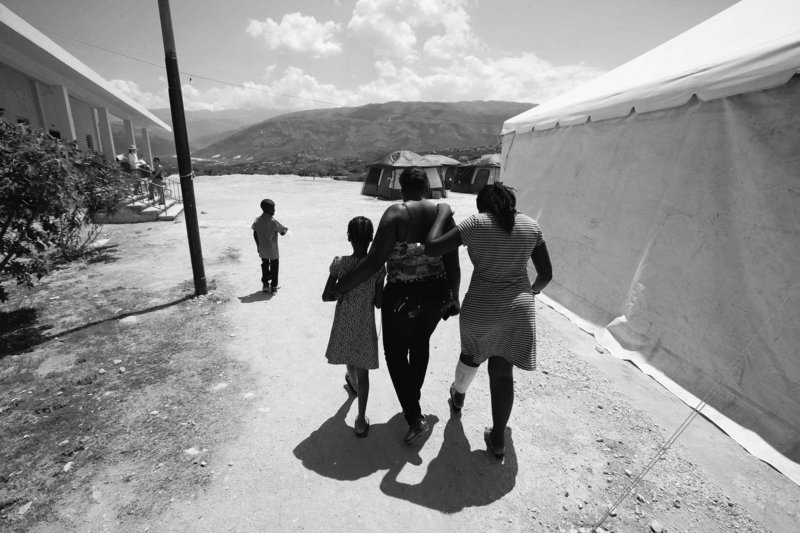PORT-AU-PRINCE, Haiti — Stranded since the earthquake, 9-year-old Ana toes the dusty concrete outside her orphanage and tells a social worker she wants to go back to live with her half sister. Within hours, the aid worker hits pay dirt, finding the adult sister in a shantytown.
But there’s a problem. The sister, an impoverished woman with two children of her own, was the one who dropped the girl at the orphanage.
“This is going to be difficult,” sighed Mario Marcellus, a Haitian caseworker for World Vision — one of five international aid groups working to trace children living in orphanages or homeless camps since the earthquake and return them to their families.
The aid groups have already found 700 children they believe were separated from their families by the earthquake, and they expect the number to rise dramatically because of a new hot line set up to report cases of separated children.
The work is tedious, especially for younger children who can’t give phone numbers or details of their families in a city where hundreds of thousands have been forced from their homes into makeshift camps. Too often, days of sleuthing lead not to joyful reunions but to parents and guardians too overwhelmed to take the children back.
World Vision has managed to find families for only 12 of its 300 cases so far. And only five children have been reunited with their families. In seven other cases, the families did not want them back.
“We have appreciated the conditions of the parents are not the greatest, but we have been shocked to learn the parents have not been looking for them, or they have not expected them back,” said Noah Ochola, the leader of World Vision’s Children in Emergencies program.
The magnitude-7 earthquake that the government estimates killed 230,000 people proved the breaking point for many families that could barely afford to feed their children before.
The World Vision team found Ana on Monday at a partially collapsed orphanage in the Tabarre flatlands on the northern edge of Port-au-Prince, sleeping with 17 other children in a tent rigged from bed sheets.
She has a rash covering her face and body that is going untreated, and orphanage director Idalia Supreme said the girl is so traumatized that she has no memory of the earthquake.
Wearing a pink dress and blue plastic sandals, Ana huddled in an alley with Marcellus, who gently prodded for clues about her life before the Jan. 12 quake: What does your house look like? What do you remember about your neighborhood?
Supreme took Marcellus aside and warned him that a reunion may not be possible for Ana and her half- sister.
“She brought her here because times are hard,” Supreme said.
The girl’s mother died when she was younger. Her father, who lives nearby, visited after the earthquake and complained that she does not belong in an orphanage. But he offered no alternative, Supreme said.
Even amid the dire conditions since the quake, the guiding principle of the aid groups is that children’s best protectors are their families. They have developed strategies to win over reluctant guardians.
Aid groups refer parents and guardians in the desperately poor country to earning opportunities such as the U.N. work-for-food program. The children are sent home with parcels of rice, sandals, toothpaste and cooking oil. World Vision also provides $60 to $150 in cash, depending on how many children the family has.
“It gives them room to think, to see beyond another two or three months what kind of work they can be engaged in,” Ochola said.
The smallest aid can make a difference.
Ramsey Ben-Achour, the Haiti director for Heartland Alliance, another of the five groups under UNICEF, said he met one man who did not want to take two of his children home from a field hospital. He had two other children, his wife died in the earthquake and their house collapsed. But after the aid group gave him two mattresses, tent tarps and food rations, he agreed to take back the children.
In Ana’s case, there are signs of progress. Marcellus explained how Ana was traumatized and living in poor conditions, and her sister agreed to meet with him and Ana at the orphanage next week.
Marcellus is hopeful: “The only reason she doesn’t want to take her sister back is because she doesn’t have money.”
Send questions/comments to the editors.



Success. Please wait for the page to reload. If the page does not reload within 5 seconds, please refresh the page.
Enter your email and password to access comments.
Hi, to comment on stories you must . This profile is in addition to your subscription and website login.
Already have a commenting profile? .
Invalid username/password.
Please check your email to confirm and complete your registration.
Only subscribers are eligible to post comments. Please subscribe or login first for digital access. Here’s why.
Use the form below to reset your password. When you've submitted your account email, we will send an email with a reset code.